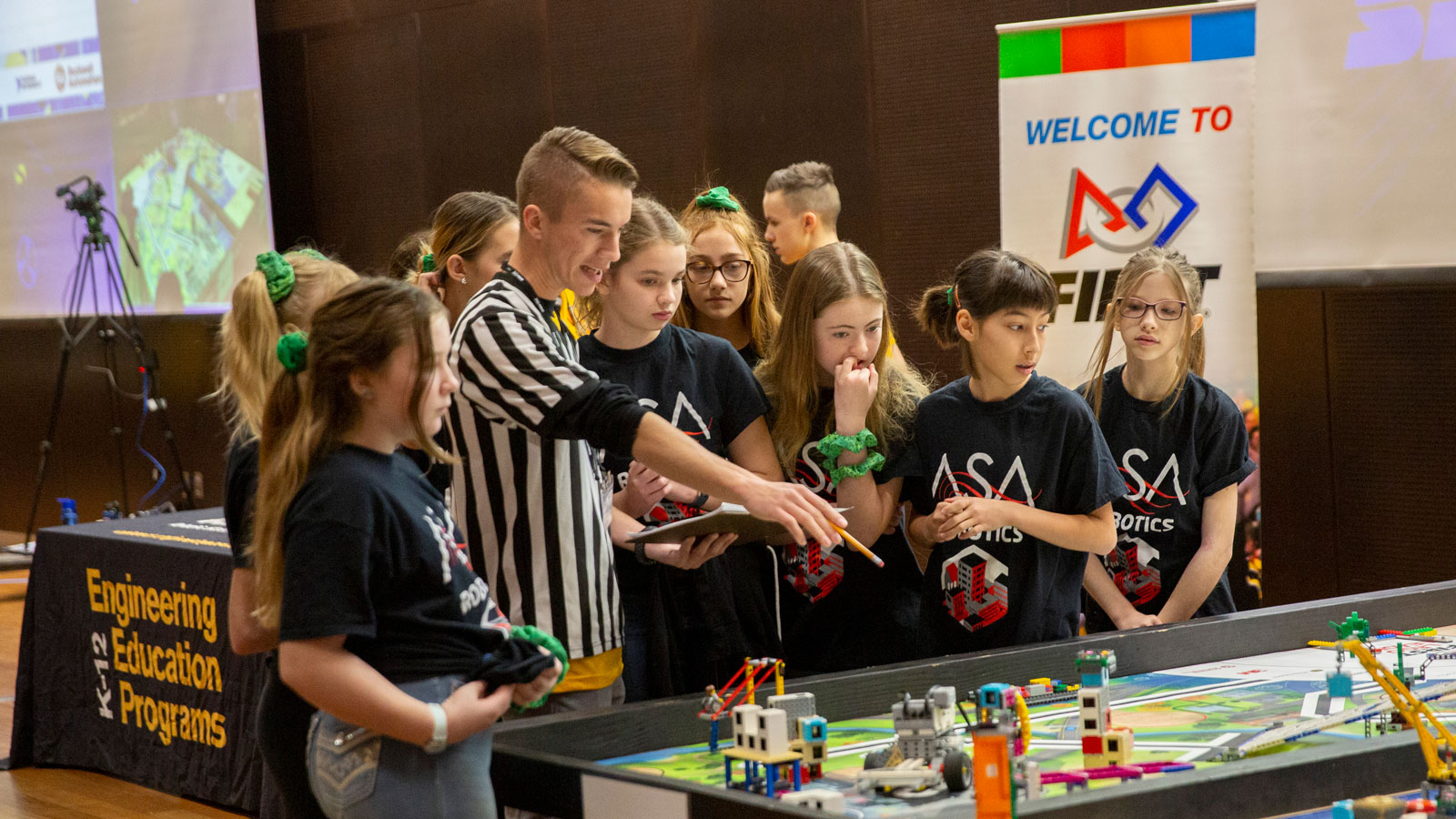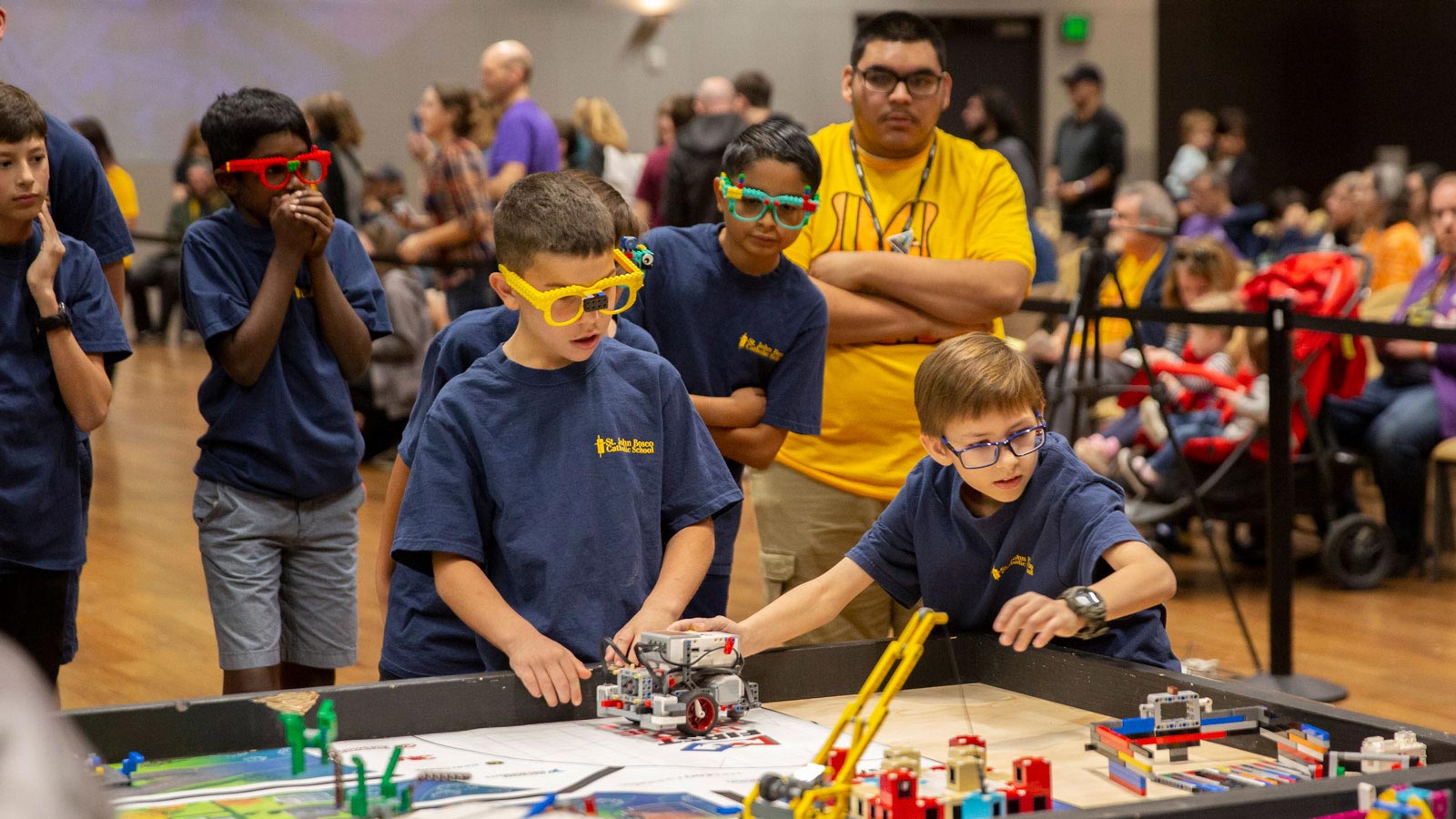Giving back to the future
ASU students invest in outreach that helped them become engineers

Convergence magazine > Giving back to the future
When we ask kids what they want to be when they grow up, “engineer” isn’t usually among the top answers. However, many of the dream jobs they do name rely on engineers, computer scientists and other technology professionals to succeed.
So introducing STEM concepts in fun ways and getting to meet engineering students and professionals can spark young people’s interest in these careers.
In fact, engaging outreach activities are what led many current engineering and computer science students to study at the Ira A. Fulton Schools. Some of these students are now returning the favor and mentoring youngsters through the same programs that introduced them to engineering.
Throughout the school year and over the summer months, the Fulton Schools conducts outreach activities for kindergarteners through high schoolers. Students can “tap into their curiosity and explore and develop what we call engineering habits of mind, which include creativity, collaboration and problem-solving,” says Jennifer Velez, coordinator senior of the Fulton Schools student outreach and recruitment programs.
ASU also partners with non-profit organization FIRST® (For Inspiration and Recognition of Science and Technology), facilitating robotics programs across the state of Arizona. University students as well as alumni and industry professionals often mentor these teams.
Convergence magazine > Giving back to the future
When we ask kids what they want to be when they grow up, “engineer” isn’t usually among the top answers. However, many of the dream jobs they do name rely on engineers, computer scientists and other technology professionals to succeed.
So introducing STEM concepts in fun ways and getting to meet engineering students and professionals can spark young people’s interest in these careers.
In fact, engaging outreach activities are what led many current engineering and computer science students to study at the Ira A. Fulton Schools. Some of these students are now returning the favor and mentoring youngsters through the same programs that introduced them to engineering.
Throughout the school year and over the summer months, the Fulton Schools conducts outreach activities for kindergarteners through high schoolers. Students can “tap into their curiosity and explore and develop what we call engineering habits of mind, which include creativity, collaboration and problem-solving,” says Jennifer Velez, coordinator senior of the Fulton Schools student outreach and recruitment programs.
ASU also partners with non-profit organization FIRST® (For Inspiration and Recognition of Science and Technology), facilitating robotics programs across the state of Arizona. University students as well as alumni and industry professionals often mentor these teams.
Laura Grosso, coordinator senior for Fulton Schools student organization and outreach retention programs, says FIRST programs teach technical skills as well as “the courage to tackle these really challenging areas of study.”
Zach Smith, a computer science student at ASU, says he knew he wanted a computer-related career as early as third grade. That’s when he began participating in FIRST LEGO League in Flagstaff, Arizona.
Smith became familiar with the college engineering experience as his FIRST Robotics Competition team competed in tournaments hosted at ASU. Talking with undergraduate students and seeing what life could be like as a computer science major at ASU made him all the more eager to study engineering.
The Fulton Schools outreach team also helps middle school and high school students see themselves as engineers through the beginner version of its Engineering Projects in Community Service, or EPICS program. Through EPICS High, ASU student mentors help guide the middle and high students to make an impact in their community by completing a project that applies engineering concepts and human-centered design skills.
Seth Mazza, now an aerospace engineering major, was already interested in engineering, but his two years of EPICS High experience gave him a new perspective and motivation to pursue engineering as a career. The experience of working with stakeholders encouraged Mazza to join the college-level EPICS program.
Not only did Smith and Mazza end up attending ASU, but their early experiences encouraged them to give back by returning to the same outreach programs as mentors for the next generation of budding engineers.
“I wanted to make sure other EPICS High students gained everything I did in the program and more,” says Mazza, who has now mentored EPICS High teams at his former high school for two years.
Mentors can make a huge difference in the lives of others, making mentorship a perfect fit for Smith who volunteers with FIRST programs, helping students who are the same age he was when he started the program.
“Seeing these students grow in the same way I did gives me hope for future engineers,” Smith says. “I know they have the skills necessary to solve the problems of tomorrow.”

A FIRST LEGO League team puts months of hard work to the test at the state championship tournament at ASU’s Tempe campus. Early positive experiences with engineering help youth see they can be engineers. Support from engineering undergraduate students through mentorship and volunteer work makes a positive impact on both mentors and participants. Photographer: Connor McKee/ASU
Laura Grosso, coordinator senior for Fulton Schools student organization and outreach retention programs, says FIRST programs teach technical skills as well as “the courage to tackle these really challenging areas of study.”
Zach Smith, a computer science student at ASU, says he knew he wanted a computer-related career as early as third grade. That’s when he began participating in FIRST LEGO League in Flagstaff, Arizona.
Smith became familiar with the college engineering experience as his FIRST Robotics Competition team competed in tournaments hosted at ASU. Talking with undergraduate students and seeing what life could be like as a computer science major at ASU made him all the more eager to study engineering.
The Fulton Schools outreach team also helps middle school and high school students see themselves as engineers through the beginner version of its Engineering Projects in Community Service, or EPICS program. Through EPICS High, ASU student mentors help guide the middle and high students to make an impact in their community by completing a project that applies engineering concepts and human-centered design skills.
Seth Mazza, now an aerospace engineering major, was already interested in engineering, but his two years of EPICS High experience gave him a new perspective and motivation to pursue engineering as a career. The experience of working with stakeholders encouraged Mazza to join the college-level EPICS program.
Not only did Smith and Mazza end up attending ASU, but their early experiences encouraged them to give back by returning to the same outreach programs as mentors for the next generation of budding engineers.
“I wanted to make sure other EPICS High students gained everything I did in the program and more,” says Mazza, who has now mentored EPICS High teams at his former high school for two years.
Mentors can make a huge difference in the lives of others, making mentorship a perfect fit for Smith who volunteers with FIRST programs, helping students who are the same age he was when he started the program.
“Seeing these students grow in the same way I did gives me hope for future engineers,” Smith says. “I know they have the skills necessary to solve the problems of tomorrow.